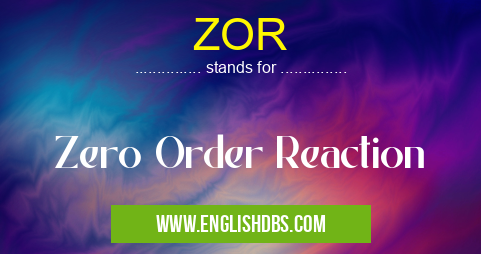What does ZOR mean in UNCLASSIFIED
ZOR stands for Zero Order Reaction, which is a type of chemical reaction where the rate of the reaction is independent of the concentration of the reactants. This means that the reaction proceeds at a constant rate, regardless of the amount of reactants present.

ZOR meaning in Unclassified in Miscellaneous
ZOR mostly used in an acronym Unclassified in Category Miscellaneous that means Zero Order Reaction
Shorthand: ZOR,
Full Form: Zero Order Reaction
For more information of "Zero Order Reaction", see the section below.
Characteristics of ZOR
- The rate of the reaction remains constant throughout the reaction.
- The rate is not affected by changes in the concentration of the reactants.
- The rate law for a ZOR is: Rate = k, where k is the rate constant.
Examples of ZOR
- Thermal decomposition of solids: The decomposition of solids, such as calcium carbonate (CaCO3), into simpler compounds occurs at a constant rate, regardless of the amount of CaCO3 present.
- Diffusion-controlled reactions: Reactions that involve the diffusion of one or more reactants through a membrane or other barrier can exhibit ZOR behavior.
- Heterogeneous catalytic reactions: Reactions that occur on the surface of a catalyst can sometimes exhibit ZOR behavior, as the rate-determining step is the adsorption of the reactants onto the catalyst surface.
Final Words: ZOR is a type of chemical reaction characterized by a constant reaction rate, independent of the concentration of the reactants. Understanding ZOR is important in various chemical processes, such as the design of reactors, the prediction of reaction times, and the development of catalytic systems.
